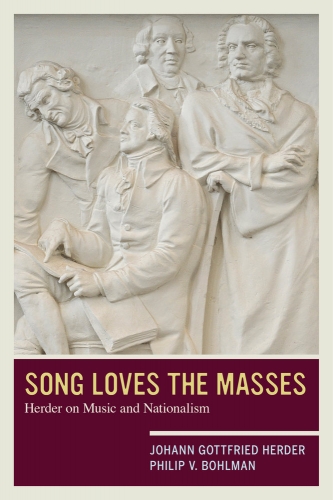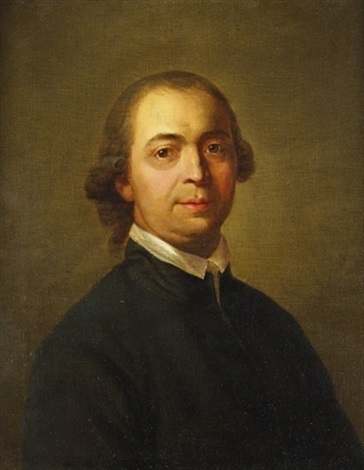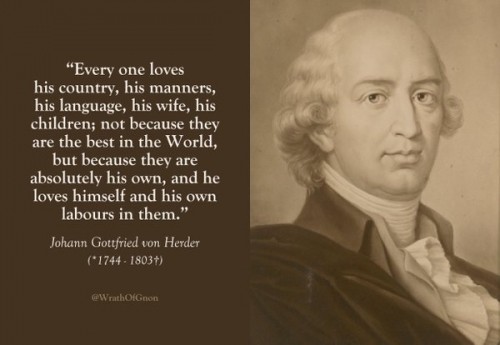Johann Gottfried Herder
Song Loves the Masses: Herder on Music and Nationalism [2]
Translated and edited by Philip V. Bohlman
Oakland: University of California Press, 2017
 Johann Gottfried Herder was an 18th-century German philosopher, theologian, translator, and critic. He wrote on many subjects: political philosophy, philosophy of mind, philosophy of history, metaphysics, linguistics, philology, art, religion, mythology, and music. He influenced several philosophers and his ideas form the basis of the modern disciplines of linguistics and cultural anthropology.
Johann Gottfried Herder was an 18th-century German philosopher, theologian, translator, and critic. He wrote on many subjects: political philosophy, philosophy of mind, philosophy of history, metaphysics, linguistics, philology, art, religion, mythology, and music. He influenced several philosophers and his ideas form the basis of the modern disciplines of linguistics and cultural anthropology.
Herder was born in 1744 to humble origins in East Prussia. He studied for two years at the University of Königsberg, where he met Johann Georg Hamann and became a favored pupil of Immanuel Kant. He then became a clergyman and teacher. A few years later he embarked on a journey throughout Europe (see Journal meiner Reise im Jahre 1769). While in Strasbourg in 1770 he met Goethe, whom his works strongly influenced. Herder became a leading figure in the Sturm und Drang literary movement. In 1776 he was made general superintendent of the clergy in Weimar and lived there for the remainder of his life.
It is only within the past two decades that much of Herder’s work has been translated into English. The texts in this book have not appeared before in English translation. This collection is also the first to compile Herder’s writings on music into one volume. It contains nine essays, each prefaced with a brief introduction by the translator. The book also contains an appendix with translations of the lyrics of 24 folk songs included in Herder’s anthology of folk music.
The first section of the book contains Herder’s essays on folk songs. Herder believed that folk music embodied a nation’s Volksgeist, or the innate character of a people as expressed through culture and civilization. In his magnum opus, Ideas on the Philosophy of the History of Mankind, he articulates the idea that each people possesses a distinct Volksgeist (he used the phrase “Geist des Volkes”) and national character. He is considered the originator of this concept.
Thus Herder conceived of the nation first and foremost as an organic community bound together by a common culture and heritage. During his lifetime, Germany was divided into hundreds of independently governed territories whose governing elites imitated the customs of the French nobility and frequently feuded, and a century earlier the nation had been ravaged by the Thirty Years War and other religious conflicts. Herder’s notion of the Volksgeist laid the foundations of German nationalism and contributed to the growth of German national consciousness during the late eighteenth and early nineteenth centuries.
Although Herder was influenced by Enlightenment thinking, he rejected the Enlightenment notion that every individual is fundamentally alike and that all people share certain moral values and psychological characteristics by default. He believed that human beings vary greatly depending upon their respective cultural contexts and that furthermore one’s cultural background (language, heritage, customs, physical environment, etc.) indelibly shapes one’s character; this occurs on the level of both the individual and the group. (The implicitly ethnic nature of his idea of the Volksgeist, despite his lack of overt racialism in a biological sense, is evinced particularly by his mention of how climate affects how groups evolve physically and mentally over time.)
This led him both to reject the homogenizing form of cosmopolitanism embraced by many Enlightenment thinkers and to advocate cultural pluralism and oppose imperialism and chauvinism (see This Too a Philosophy of History for the Formation of Humanity). For this reason he is sometimes portrayed as a forerunner of modern multiculturalist progressivism. But Herder’s concept of pluralist nationalism runs counter to the modern promotion of open borders and globalization, which pose a threat to the existence of distinct national cultures and the homogeneity of individual groups. Others have pointed out that the cosmopolitanism espoused by modern Western liberals is ironically a form of “white supremacy” as it assumes that all peoples of the world, from African tribesmen to Mongolian goat-herders, uphold Western values and aspire toward Western civilizational standards.
Herder’s belief that the Volksgeist of a nation was expressed in its ancient poetry and folk music led him to take an interest in reviving ancient folk songs. In the first essay, he argues that folk songs must be collected and anthologized in order to “catch a spark from the spirit of the German fatherland, albeit buried in ash and rubble” and preserve folk songs before they were lost to history. He compiled folk songs into two anthologies: Volkslieder in 1774 and Alte Volkslieder in 1778 and 1779, first published serially as four volumes and later as two larger volumes (a second edition was published posthumously in 1807, titled Stimmen der Völker in ihren Liedern). The anthology contained 194 folk songs from a variety of European countries and was an influential text throughout the nineteenth century. Herder’s translation of the text of the Scottish folk song “Edward, Edward” inspired Brahms’s Ballade, op. 10, no. 1 and Schubert’s “Eine Altschottische Ballade.”
Herder’s conception of folk music encompassed ancient epic poetry as well as traditional folk songs. The epilogue contains a brief excerpt from his Treatise on the Origin of Language, in which he concludes at one point that human language evolved from the primitive capacity for song (a theory that a number of modern studies corroborate). Epic poems were of course originally meant to be sung. Herder writes of Homer: “The greatest singer of the Greeks, Homer, is at the same time the greatest folk poet.” He most admired the Homeric epics, the Norse Edda, the Nibelungenlied, The Poems of Ossian, and the Old Testament.
Therefore this book also includes essays by Herder on epic poems. Most notable of these is one containing fragments from his Briefwechsel über Ossian und die Lieder alter Völker (Correspondence about Ossian and the Songs of Ancient Peoples), published in 1773 in the manifesto Von deutscher Art und Kunst (which also contained his essay on Shakespeare and essays by Goethe and Justus Möser). The manifesto outlines a path toward creating German art, literature, and music reflecting Germany’s national past.
The Poems of Ossian are a cycle of epic poems purportedly collected and translated (from Gaelic to English) by the Scottish poet James Macpherson. The character of Ossian was based on legends surrounding Oisín, a warrior-poet in Irish mythology. While the authenticity of the poems was disputed, the work was lauded by many as a successor to the Homeric epics.
To Herder, the question of whether the poems were authentic was secondary. He was more concerned with the issue of translation and how translating the original Gaelic into English and then into German would refract the original through a different lens. He criticized Michael Denis’s German translation of the poems on the charge that his scholarly imitation of Greek hexameter formalized the verse and tamed its “wild” character, saying that his translation lacked “feeling for sound or singing, no real sense of fresh air from the hills of Caledonia” and did not reflect the spirit of the poems’ source material, which consisted of folk songs sung by the common people.
 Herder believed that “wild” peoples produced literature that was more lively, lyrical, and free. The ancients were constantly forced to confront nature, which imbued their art and poetry with a vitality that modern men lack. He mentions in the essay that he read Ossian while standing on a ship’s deck during a rough storm and writes that “in the midst of such experiences the Old Norse singers and the bards emerge from your reading entirely unlike anything you might experience in a professor’s classroom.” The direct contact with the elements at sea and the imminent possibility of danger and death approximated the circumstances that originally gave rise to epic poetry.
Herder believed that “wild” peoples produced literature that was more lively, lyrical, and free. The ancients were constantly forced to confront nature, which imbued their art and poetry with a vitality that modern men lack. He mentions in the essay that he read Ossian while standing on a ship’s deck during a rough storm and writes that “in the midst of such experiences the Old Norse singers and the bards emerge from your reading entirely unlike anything you might experience in a professor’s classroom.” The direct contact with the elements at sea and the imminent possibility of danger and death approximated the circumstances that originally gave rise to epic poetry.
Herder revered the ancients and did not adhere to the idea that history consists of a never-ending upward march of progress with each civilization merely serving as a stepping-stone to a higher one. Nonetheless he was not a primitivist. He believed that humans were distinguished from animals by their potential to cultivate “humanity,” or civilization, and welcomed progress in the arts and sciences. However he saw the idea of universal progress as a falsehood and held that different civilizations evolve at different rates. Thus in order for human perfectability to be achieved, each nation (and each individual within a nation) must fulfill its own destiny and evolve according to its own internal logic, which entails affirming the separateness of different nations.
The Ossian poems inspired Herder to embark on his first collection of folk songs. It was in his essay on Ossian that Herder coined the term Volkslied. He believed that German art should emulate Macpherson’s method of gathering material from folk tradition and using this as a foundation upon which to create something new. He criticized German poets and writers of his day for aping foreign literary conventions rather than drawing from ancient native traditions.
It is perhaps worth noting that Herder’s edition of the Ossian poems contained extensive annotations written by Melchiorre Cesarotti, who had translated the work into Italian. Cesarotti’s notes bore the influence of Giambattista Vico, which in turn may have indirectly influenced Herder. This is notable given that Vico’s work was virtually unknown at the time.
There are certain parallels as well as points of divergence between the two. Both were philosophers of the Enlightenment who were critical of Enlightenment thinking.[1] Both prefigured nineteenth-century historicism: in the words of Robert T. Clark, “it was Vico’s conviction that by examining the available documents on the subject of primitive culture he could discover a ‘metaphysics of history’ which would sweep the ground from under the Cartesian-Protestant position. . . . Vico and Herder did not evaluate the culture of a given age on the basis of their own–the error of the Cartesians–but instead sought for an adequate statement of its essential characteristics as revealed in a careful study of available information.”[2] (Vico reconciled this particularist view with the universality of his cyclical philosophy history by distinguishing between convention and human nature.) Like Herder, Vico believed that myth was central to civilization and saw works of literature and art as artefacts that shed light on the entire cultural organism from which they arose. He associated each age of history (the age of gods, the age of heroes, and the age of man) with different patterns of language: hieroglyphs, signs, and symbols; simile and metaphor; and irony respectively.
Some of the similarities between Vico and Herder are coincidental (e.g., their similar ideas on the origin of language) but it is possible that Herder’s theories of interpretation were indirectly influenced by Vico to some extent.
Herder’s interest in ancient epic poetry also led him to translate The Poem of the Cid (El Cantar del Mio Cid) into German. Excerpts from his translation are included in the book. The original poem is thought to have been written in the twelfth century. The eponymous hero of El Cid was a Castilian nobleman and military leader during the Reconquista. He was known for his skill as a military commander in expanding the territory of Castile and became a Castilian national hero. The poem chronicles the time roughly beginning with his exile from Castile in 1081 and ending shortly before his death in 1099.
Herder sought to create a bridge between past and present by evoking the heroism and nationalism of the original verse in German amid the atmosphere of modern Europe. Bohlman claims that “when nineteenth- and twentieth-century European linguists and historians set out in search of national epics, Herder’s Cid was their inspiration and their model.”
Music remains in the background in Herder’s Der Cid, both in terms of his attention to the sound of the poem (cadence, rhyme, assonance, etc.) and the invocation of music itself throughout, as in this stanza:
Priests and soldiers alike, in full voice,
Sang mass for the Cid,
And trumpets loudly heralded
The holy secret;
Cymbals rang, kettle drums roared,
So that the holy archways
Shook; a renewed courage of heroes
Filled the hearts of all the soldiers,
The three hundred so intrepid,
To enter into struggle against the Moors,
The Moors in Valencia.
This follows a dramatic scene in which El Cid forces King Alfonso VI to take an oath swearing that he was not the one who murdered his brother, the former king. Alfonso was offended by the public challenge to his honor and exiled El Cid from Castile, stripping him of his land and possessions. The “three hundred” refer to the men who remained loyal to him. El Cid and his 300 men went on a number of military campaigns and eventually conquered Valencia.
Herder also translated Handel’s Messiah, which he called “truly a Christian epic in music.” As a theologian and clergyman, Herder saw religion and music as being closely intertwined. Martin Luther (whom Herder strongly admired, though he lamented that Luther did not found a German national church) likewise held that music was “next to theology” and was divine in origin. Two of the essays here discuss sacred music. Herder’s criticism of the Pietists (a contemporary Lutheran movement) gives an idea of his views on sacred music in general: “Pietism has reduced sacred song to chamber song with sweet, feminine melodies, filled with tender sensitivity and rubbish, thus stripping it of all the majesty that commands the heart, and making it a weakling at play.”
The final essay in this book consists of the chapter on music from Herder’s last major work, Kalligone, in which he outlines his philosophy of aesthetics. The chapter is essentially a defence of music as an art form. Here he objects to Kant’s claim in The Critique of Judgment that music ranks below the visual and literary arts on account of the fleeting duration of sounds and the inherently passive nature of aural perception compared to visual perception and argues that these factors in fact render music more capable of creating an individual impression upon the listener from within. He sees music as an art of movement (“arrival and departure, becoming and being“) whose temporality enables it to best capture the fluctuations of human emotion and realize the sublime. On a broader level he argues that Kant’s a priori principles regarding aesthetic judgment led him to erect false barriers between cognition and sensation, between types of consciousness, experience, etc.
Herder repeatedly states that music, art, and poetry all reflect the character of their creators and the nations to which they belong but also remarks that the reverse is true in equal measure. He writes of poets: “A poet is the creator of the people in whose midst he writes: he gives them a world to see and has their souls in his hand in order to guide them into that world” [italics Herder’s]. Thus nations are built by artists and poets, whose works serve as national founding documents.
Notes
1. See Isaiah Berlin’s Three Critics of the Enlightenment: Vico, Hamann, and Herder.
2. Robert T. Clark, Jr., “Herder, Cesarotti and Vico,” Studies in Philology, vol. 44, no. 4 (October 1947): 647–48.





 del.icio.us
del.icio.us
 Digg
Digg
Les commentaires sont fermés.